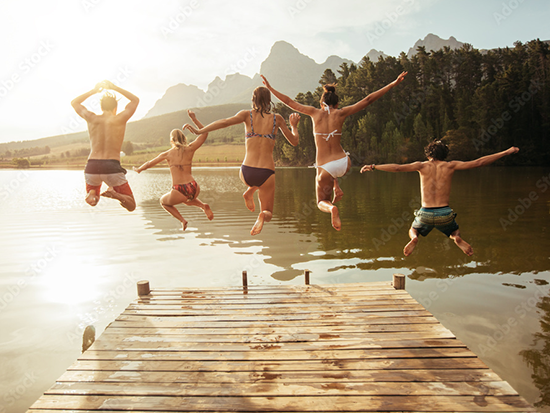 UAB expert offers interesting facts about the safety of natural bodies of water as they relate to summer fun.With summer in full effect, many are looking for fun in the sun. Swimming is known as the staple activity of the season, and many in Alabama tend to enjoy the numerous natural bodies of water found across the state.
UAB expert offers interesting facts about the safety of natural bodies of water as they relate to summer fun.With summer in full effect, many are looking for fun in the sun. Swimming is known as the staple activity of the season, and many in Alabama tend to enjoy the numerous natural bodies of water found across the state.
However, while fun, unlike man-made pools which are cleaned and regulated, natural bodies of water can present potential safety concerns. Stephen Watts, Ph.D., professor in the University of Alabama at Birmingham Department of Biology, provides tips for a safe and healthy summer season.
“For the most part, swimming in lakes and rivers is relatively safe,” Watts said. “However, there are always going to be some pathogens present in these natural bodies of water, and while most may be relatively harmless, there are some that can be negatively impactful.”
Analyzing the details of the surface of the water can be the No. 1 indicator for what should and should not be swum in. Using the common discretion of what looks relatively clear and natural versus what looks muddled and murky is often a good determinate of proposed safety.
 Stephen Watts, Ph.D.,
Stephen Watts, Ph.D.,
Photography: Lexi Coon“Natural bodies like lakes and ponds should always be judged critically at face value when observing the surface,” Watts said. “If you see floating rafts of filamentous algae, a stained surface, a glossy or oily look, that typically means that the water is very high in nutrients and could harbor higher concentrations of bacteria or another pathogen.”
Notable bacteria of concern would be the coliform E. coli, as well as dangerous protozoans like amoeba.
“It is very rare for amoeba to cause problems, but be aware that they can be prolific in very warm and stagnant water,” Watts said. “Also, always keep in mind that the quality of these natural bodies is often impacted by the wildlife that are present in the environment.”
Watts encourages immunologically compromised individuals to remain extra vigilant when assessing whether to swim in any natural body because their first line of defense is already weakened. A bacterium that may be easily fended off by a person with a fully intact immune system may find greater ease invading and attacking an immunologically compromised individual.
Learn more about swim safety: Four elements for swim safety.
Ultimately, Watts believes that good judgment is the No. 1 tool in remaining safe this summer and every summer.
“Basic safety precautions need to be considered as they relate to the physical structures (submerged trees, rocks, etc.) and other attributes of these natural bodies,” Watts said. “For the most part remember that, if the water looks compromised, it likely is. So always use a keen perception and good judgment and you will likely stay safe and have fun this summer.”
Always check with your local health department for any updates and announcements on the water quality within your area.